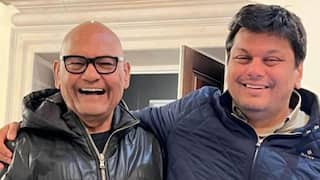Sri Lankans Undeterred On Demand For President Gotabaya Rajapaksa's Resignation, Protests Continue
Mahinda Rajapaksa quit as prime minister on Monday as the protests against him faced violence from his supporters. He is said to be hiding in a military base.

New Delhi: The appointment of Ranil Wickremesinghe as Sri Lanka's new Prime Minister has failed to appease anti-government protesters demanding the resignation of President Gotabaya Rajapaksa for the country's disastrous economic crisis. Wickremesinghe is set to form a unity government today after the President appointed him as the island nation's prime minister late on Thursday following a week of violent clashes that caused 9 deaths and had over 200 people injured.
"We will stop this struggle when our people get justice," Chamalage Shivakumar said, one of the hundreds of protestors at a protest site in the main city Colombo, as quoted by news agency Reuters.
"Whoever they appoint as prime minister, we will not stop this struggle until people get relief," he added.
ALSO READ | Newly Sworn-In Sri Lankan PM Thanks PM Modi For India's Aid, Seeks 'Closer Relationship' With Nation
Mahinda Rajapaksa quit as prime minister on Monday as the protests against him faced violence from his supporters. He is said to be hiding in a military base.
PM Wickremesinghe is the only lawmaker from his United National Party in Sri Lanka's parliament. The unity government led by him will depend on support from rival political parties while an alliance led by the Rajapaksas holds about 100 of parliament's 225 seats and the opposition has 58 seats. The rest are independent.
Reuters reported protesters as saying that the appointment of veteran opposition leader Wickremesinghe as Sri Lanka's new Prime Minister will do little to ease the anger against the President, who they believe to be ultimately responsible for the worst economic crisis to hit the island nation since it became independent in 1948.
The pandemic, rising oil prices, and populist tax cuts by the Gotabaya brothers are seen as factors that led to the situation in Sri Lanka wherein it is critically low on foreign exchange and faces rampant inflation and fuel shortages.
The agitations were largely peaceful until violence erupted on Monday after an attack on the anti-government protesters by Mahinda Rajapaksa's supporters.
The incident triggered widespread violence against Rajapaksa loyalists, leaving nine people dead and wounding over 200 others.
Sri Lankan PM Wickremesinghe Says Protests Near President's Residence To Continue
Meanwhile, the newly sworn-in Prime Minister Wickremesinghe has said that his focus was limited to tackling the economic crisis.
“I want to settle this problem to ensure the supply of petrol, diesel, and electricity to the people,” Wickremesinghe said, as quoted by news agency PTI.
Wickremesinghe was appointed the Prime Minister as the main Opposition Samagi Jana Balawegaya (SJB) party and the third-largest party Janatha Vimukthi Peramuna (JVP) put up tough conditions, such as the resignation of President Rajapaksa, to lead the interim government.
The veteran politician is seen as being close to the Rajapaksa clan. But he does not currently command a lot of support from the Opposition or among the public. It remains to be seen if he can prove his majority in the 225-member Parliament.
Referring to the islandwide protests, Wickremesinghe has said the main protest near president Gotabaya Rajapaksa’s secretariat for over a month now would be allowed to continue.
“I will talk to them (protesters) if they are willing," he said.
All political parties are to be stakeholders in the interim government for a limited period before facilitating a parliamentary election.





































